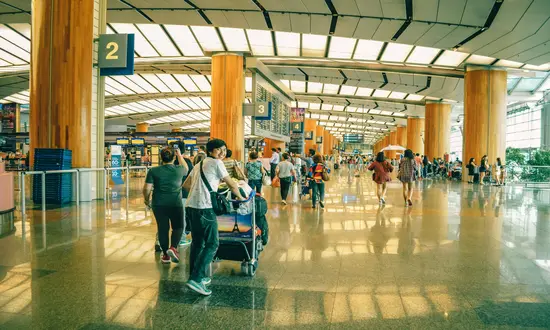
Reimagining The Travel Industry With AI
- 25 August 2023
The travel industry has gone through its fair share of changes in recent years. With the onset of more digital technology – such as AI, machine learning, and automation – it’s only natural to assume that the industry is about to undergo a major revolution. AI has been used for various applications in the travel industry: from booking flights and hotels, providing personalized travel recommendations, to helping customers with their queries. In this blog post, we’ll explore how AI is transforming the way we think about and interact with travel services and how it is helping to make our journeys more efficient, smoother and enjoyable.
How AI is changing the travel industry
AI is changing the travel industry by providing new opportunities for travelers to find the best deals on vacation packages, hotel rooms, and airfare. In addition, AI is helping travel companies better understand customer preferences and tailor their offerings to match. As a result, the travel industry is becoming more efficient and effective in meeting customer needs.
The benefits of using AI in the travel industry
Artificial intelligence has the potential to revolutionize the travel industry. Here are some of the benefits of using AI in the travel industry:
1. Enhanced customer experience: AI can be used to personalize the travel experience for each customer. For example, it can be used to provide recommendations on things to do and see based on their interests.
2. Improved efficiency: AI can help streamline various processes in the travel industry, such as booking flights and hotels, and managing itineraries. This can lead to increased efficiency and cost savings for businesses.
3. Greater insight: AI can provide businesses with valuable insights into customer behavior and preferences. This data can be used to make better-informed decisions about product development, marketing, and other areas of the business.
The challenges of using AI in the travel industry
AI can help travel companies in a number of ways, from reducing operational costs to providing a more personalized experience for customers. However, AI is not without its challenges, and the travel industry is still figuring out how best to harness its potential.
One of the biggest challenges is data collection. In order to train AI systems, companies need large amounts of data – and travel companies often have trouble collecting this data. This is because customer data is spread across different platforms and booking systems, making it difficult to consolidate. Other challenges include dealing with unstructured data, such as natural language reviews, and getting buy-in from employees who may be resistant to change.
Despite these challenges, AI holds great promise for the travel industry. Companies that are able to overcome these hurdles will be well-positioned to reap the benefits of this transformative technology.
The travel industry is ripe for disruption
The travel industry is ripe for disruption. With the advent of new technologies, the way we book and plan travel is changing. No longer are we bound by the traditional methods of booking flights and hotels. We can now use artificial intelligence (AI) to personalize our travel experiences in ways that were once impossible.
By using AI, we can customize our travel itineraries to match our preferences and budget. We no longer have to worry about finding the best deals on flights and hotels – AI will do it for us. And because AI can access data from all over the world, we can be sure that we’re getting the most up-to-date information about our destination.
So if you’re looking to shake up your travel routine, consider using AI to plan your next trip. You may be surprised at how easy and enjoyable it is to let technology take care of the details.
How artificial intelligence can help
Artificial intelligence has the potential to revolutionize the travel industry, making it more efficient and personalized. Here are some ways AI can help:
1. enhancing the customer experience by providing more personalized recommendations and preferences;
2. helping to streamline operations by automating tasks such as booking tickets and managing reservations;
3. improving security by identifying risks early and flagging potential threats;
4. reducing costs by optimizing routes and schedules.
What a future travel landscape might look like
The future of travel will be fascinating, with many new technologies emerging to make travel more seamless and convenient. Here are some examples of how AI will change the landscape of travel:
1. Automated trip planning: Imagine being able to tell your AI assistant where you want to go and have it automatically plan out the entire trip for you, including booking flights, hotels, and activities. This will take all the hassle out of trip planning!
2. Virtual reality tours: Thanks to VR technology, you'll be able to tour destinations around the world without even leaving your living room. This will be a great way to explore new places and get a feel for them before actually booking a trip.
3. Personalized recommendations: AI will be able to analyze your travel history and preferences to offer tailored recommendations for future trips. This means you'll always have ideas for your next adventure, whether it's a weekend getaway or a longer vacation.
4. Enhanced customer service: From chatbots that can help you book tickets or find information about your destination, to in-depth artificial intelligence customer service agents that can provide personalized assistance, AI will revolutionize the way we receive customer service while traveling.
5. Smarter transportation: In the future, self-driving cars and other autonomous vehicles will make getting around much easier (and safer!). This could also lead to cheaper transportation options since there would be no need for drivers.
How to get started with AI in the travel industry
If you work in the travel industry, you know that competition is fierce. Online booking sites and mobile apps have changed the game, making it easier than ever for customers to find the best deals and book their travel plans with a few clicks. In order to stay ahead of the curve, it's important to keep up with the latest technology trends – and one of the hottest trends right now is artificial intelligence (AI).
AI is already being used in a variety of industries, from retail to healthcare, and it's showing promise in the travel industry as well. From chatbots that help customers with their booking questions to predictive analytics that can suggest personalized itineraries, AI can help travel businesses boost efficiency and improve customer service. If you're looking to get started with AI in your business, here are a few tips:
1. Define your goals. What do you hope to achieve by implementing AI? Whether you want to increase sales, reduce costs, or improve customer satisfaction, it's important to have a clear goal in mind before getting started.
2. Do your research. Not all AI solutions are created equal. It's important to do your homework and find a solution that fits your specific needs. There are a number of different AI providers out there, so take some time to compare options and read reviews before making a decision.
3. Start small. Implementing AI doesn't have to be an all-or-nothing proposition – you can start small and
Conclusion
AI has the potential to revolutionize the travel industry by enhancing customer experience, personalizing services and providing more accurate data insights. As technology advances, AI can be utilized in new ways to improve efficiency and reduce costs for travelers around the world. With an ever-growing global population, it is important that companies explore how machine learning can be used to make traveling smarter, easier and safer for all involved. We look forward to seeing what creative applications of AI will come out of this reimagining process!
Power Your Business with Smart AI Solutions
Contact Us Schedule a ConsultationRecent Posts

Building a Scalable SaaS Architecture

Optimizing Banking using AI and Predictive Analysis

Neobanks & Technology: Disruption in Banking Industry

The ultimate guide to Product Design Process
Contact us
Contact us right now and let us be your reliable partner for developing enterprise & web apps.
Contact Us
